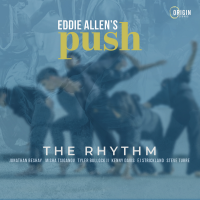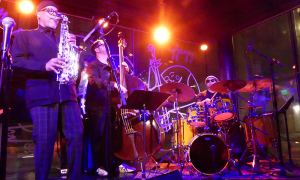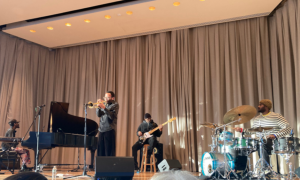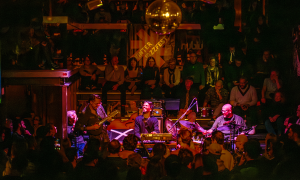Home » Jazz Articles » Live Review » Billy Taylor: A Comma - Not a Period
Billy Taylor: A Comma - Not a Period
It was absolutely appropriate that he choose an Ellington composition, in the town of Ellington
 The second and last set of pianist Billy Taylor's final public performances on March 31, 2005, was an emotional experience for many reasons. Although Taylor was born in North Carolina, Washington, DC was his home from the age of five, until he graduated Virginia State University. At the age of thirteen, Taylor played his first professional date at The Republic Gardens, a small club on the historic "U Street corridor of Washington, which contained many since closed venues (The Republic Gardens, although no longer a jazz haunt, remarkably remains open). Moreover, Taylor has, for over last ten years, served as the artistic advisor to The Kennedy Center's continually growing and evolving jazz series. It was thus appropriate that the current New Yorker choose to conclude his performing career in Washington, DC.
The second and last set of pianist Billy Taylor's final public performances on March 31, 2005, was an emotional experience for many reasons. Although Taylor was born in North Carolina, Washington, DC was his home from the age of five, until he graduated Virginia State University. At the age of thirteen, Taylor played his first professional date at The Republic Gardens, a small club on the historic "U Street corridor of Washington, which contained many since closed venues (The Republic Gardens, although no longer a jazz haunt, remarkably remains open). Moreover, Taylor has, for over last ten years, served as the artistic advisor to The Kennedy Center's continually growing and evolving jazz series. It was thus appropriate that the current New Yorker choose to conclude his performing career in Washington, DC.The evening was officially a part of the institution's A New America: The 1940s and the Arts series and the program was dedicated to one of Taylor's friends and mentors — Dizzy Gillespie. As Taylor briskly entered the stage, he introduced his regular working trio of Chip Jackson on bass and Winard Harper on drums. The thematic insistence of the 1940's, however, did not preclude Dr. Taylor from performing two of his own compositions. He began by playing "C-E-G (named after the triad upon which the piece is centered) and he followed with a tribute to Martin Luther King — "If You Really Are Concerned Then Show It. The latter contained an infectious Latin backbeat (Taylor was, after all, in Machito's mambo band) where Winard Harper was just enough ahead of the beat to provide a propulsive and ebullient effect upon the constantly grinning musicians.
Trumpeter Jon Faddis, an acknowledged protégée of Dizzy Gillespie, joined the trio on stage for some discussions about the bebop legend. As was his format in the NPR series "Billy Taylor's Jazz At the Kennedy Center (which, like almost all jazz programming, was brutally cancelled by NPR in its Stalinist purge of all independent arts efforts), Taylor conversed with his guest and spoke to the audience prior to, and after, each composition. Faddis entertained the audience about his first meeting of Gillespie, and spoke of his emotions when he first played with the giant as an awe-struck fifteen year old. The conversation led the group to speak of Gillespie's "Manteca ; Faddis described the stylistic manner of the drums and bass within Gillespie's group focusing upon their independent and respective thematic and rhythmic patterns, while Gillespie soared over the group articulating yet another musical idea. The group launched their own version, and Faddis illustrated his ability to contribute his own ideas to the classic.
The group continued with, perhaps, an inevitable discussion and performance of "A Night in Tunisia. Although played countless of times upon the stages of innumerable jazz shrines, Dr. Taylor could not help but find new and nuanced means of expressing hidden gems within a composition. Faddis strained the upper registers of the instrument, Harper displayed a polyrhythmic furry, and Jackson plucked insistent and repeated patterns to create a
As the evening approached its sadly inevitable conclusion, Taylor expressed his appreciation for the never ending learning process within his musical experience. He mentioned that one of Gillespie's favorite compositions was "All The Things You Are . Taylor was unaware, however, of its inspiration for another piece until Faddis relayed what his mentor had taught. As Taylor began the introductory chords, Faddis illustrated on the keyboard how it was transformed by Gillespie into "Con Alma . The trio quickly began the Gillespie composition and, for approximately five minutes, played a truly heartfelt tribute to their departed friend. With the final sounds from the instruments, Taylor gracefully bowed, stepped aside, and first acknowledged his colleagues, as if the evening had been devoted to their efforts solely; his modesty was touching.
The standing ovation was immediate and several television cameras captured Taylor's exit from the stage. He reemerged from the billowing curtains to play his final selection. It was absolutely appropriate that he choose an Ellington composition, in the town of Ellington's birth. It was not the roaring and jubilant "Take the 'A' Train with which most people are aware. Rather, it was a lilting and absolutely heart breaking expression of inevitability and final hope. Faddis peppered the performance with muted tender phrases and the trio slowly and silently faded into their destination. The evening had concluded in a whisper.
Although Taylor will no longer perform, he will remain active within the international jazz community. He will continue to serve as "Artistic Adviser for Jazz at The Kennedy Center. His CDs continue to be released; "Taylor Made at the Kennedy Center," a CD available only on the web and in Kennedy Center shops, was released the same morning of this final event. He will write his memoirs. He also stated his intention to continue with educational seminars. After the performance, Taylor generously sat behind a table in the lobby as hundreds of people lined up after midnight to have their programs and CDs autographed. The octogenarian spent time with each person, emanating his characteristic compassion, modesty and charm. The final performance was — as he stated in a recent interview — merely a comma, and not a period.
Visit Billy Taylor on the web.
Related Article
Final Notes: Dr. Billy Taylor Retires from Concert Performance
Tags
PREVIOUS / NEXT
Support All About Jazz
 All About Jazz has been a pillar of jazz since 1995, championing it as an art form and, more importantly, supporting the musicians who make it. Our enduring commitment has made "AAJ" one of the most culturally important websites of its kind, read by hundreds of thousands of fans, musicians and industry figures every month.
All About Jazz has been a pillar of jazz since 1995, championing it as an art form and, more importantly, supporting the musicians who make it. Our enduring commitment has made "AAJ" one of the most culturally important websites of its kind, read by hundreds of thousands of fans, musicians and industry figures every month.


























